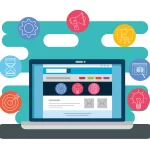
Adaptive Learning in Education & Corporate Training | 2025 Guide
January 17, 2024
Workplace Harassment Prevention: Building a Culture of Respect
January 30, 2024Essential Skills for Success Beyond Remote and Onsite
The world of work has undergone a transformative shift, demanding a higher degree of adaptability than ever before. As companies embrace more flexible work models, the need for essential skills in a hybrid workplace is on the rise.
In this comprehensive exploration, we delve into the vital skills that go beyond the traditional onsite and remote work scenarios, providing valuable insights into the nuanced dynamics of a hybrid environment.

Adaptability in the New Normal
Understanding the Dynamics of a Hybrid Workplace
Top Skills for Hybrid Work
- Tech-savviness: In a remote environment, employees had to master tools like video conferencing platforms and messaging apps. This can also be different if you are working for different clients. In the hybrid workplace, this proficiency extends to a mix of virtual and in-person connections. Troubleshooting connectivity issues for remote teammates or connecting devices for presentations become crucial hybrid skills.
- Self-management: Success in hybrid work demands a high degree of self-discipline. Remote workers must maintain a structured routine independently, while in a communal workspace, they need to stay focused amid potential distractions. (Employees tend to get distracted or get pulled towards the ‘work of home’!) This requires honing skills in time management, project management, productivity, and mindfulness.
- Virtual collaboration: In a hybrid model, all collaboration happens virtually. This collaboration works very well when they meet face-to-face. The challenge is for employees to contribute equally, irrespective of their physical location. Enhancing skills in communicating through digital channels, participating in virtual meetings, and using collaboration tools becomes imperative.
- Adaptability: Unlike traditional settings where employees could adopt a set of skills fit for their environment, the hybrid workplace demands fluidity. Employees move between situations like virtual meetings and in-person brainstorming, requiring them to create boundaries between work and home life in their remote office while also staying focused in a bustling office environment. This can be challenging at times when they have continuous calls and virtual meetings.
- Communication: It is a well-known fact that communication is very effective if it happens in-person or face-to-face. However, the styles of communication in hybrid teams vary depending on the circumstance. Recognizing when and how to share ideas through succinct, clear written communication or engaging in two-way in-person conversations are vital skills in a hybrid setting.
- Well-being: Prioritizing well-being at work is crucial in the hybrid model. Employees combat isolation and screen fatigue in remote work, while also navigating potential stressors of the office environment. Skills like stress management, mindfulness, and an understanding of physical and mental health issues become essential for maintaining a sense of health and happiness.
- Adaptive Leadership: Leaders in the hybrid workplace must foster a culture of trust, help teams navigate diverse work settings, and provide guidance without getting into micromanagement activities. Inclusive leadership that avoids proximity bias, inspires, communicates effectively, and cultivates a sense of belonging across the board is paramount.
Supporting Employee Growth
As the hybrid workplace becomes the new norm, success lies in the ability to adapt. Whether you are an employee open to new ways of working or an employer creating a supportive environment, embracing the change is the key. Proper planning also becomes crucial from both sides - things to be done remotely, activities or meetings to be done in the office need to be decided well in advance to avoid any project delays and miscommunication. The twists and turns of the hybrid workplace can be navigated successfully with a flexible and open-minded approach.
Nevertheless, the learning can happen from anywhere, anytime.
Checkout K-nest LMS for Employee Training.



